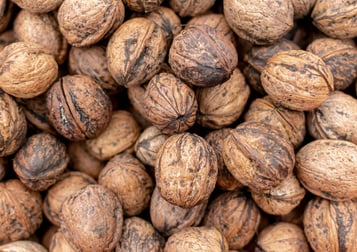Walnut Oil: Your Guide To This Amazing Liquid


Maybe you heard about the health benefits of walnut oil and want to add it to your diet to reduce the risk of heart diseases. Maybe you want to use it as a completely natural skin care product. Or maybe you just like the taste of walnuts and want to find ways to add the flavor to more dishes. Wherever the reason, this is your comprehensive guide to the different varieties of walnut oil, how it's produced, its culinary and cosmetic uses, health benefits, environmental impact, and more.
Let’s start from the beginning. Walnut oil is not a new thing – just like walnuts, it has been around for a long time. Prized for its nutty flavor and packed with nutrients and bioactive compounds, it has been used for centuries for cooking, skincare, and arts. Recently, though, with problems like chronic diseases and obesity plaguing many developed countries, walnut oil has become popular as a healthy alternative to the mass produced vegetable and seed oils.
There is a good reason for that. Walnut oil is one of these rare things which live up to their reputation. It is a versatile and nutrient-rich oil (with a nice delicate flavor!) that offers a range of health benefits. From improving heart health and brain function to nourishing the skin, it's a valuable addition to both your kitchen and skincare routine. And these are only some of the things we know about, while scientists are discovering more and more potential benefits.
Not all walnut oil is equal, though – this guide will help you choose, buy, store, and use it in a way that provides maximum benefit for you.


Photo by Tom Hermans | Unsplash
Types of Walnut Oil
Most walnut oil is made from the common walnut (Juglans regia for the botanically inclined), a species of walnut native to the Old World. Some specialty producers make oil from black walnuts (Juglans nigra), which are native to North America.
Irrespective of the walnut species, the oil can be classified by the method of extraction, This has a huge effect on the overall quality and benefits of the final product:
Cold-Pressed Walnut Oil: Cold-pressed walnut oil is made by pressing walnuts at low temperatures, typically below 120°F (49°C). This helps preserve the oil's flavor, aroma, and nutritional properties. Cold-pressed walnut oil has a light color and pronounced nutty taste. It's considered the highest quality and tends to be the most expensive.
Refined Walnut Oil: Refined walnut oil is processed at higher temperatures and using chemical solvents to extract more oil from the nuts. This process produces a more neutral-flavored oil with a longer shelf life and a higher smoke point, which makes it more suitable for cooking. However, during refining the oil loses some of the nutritional benefits of the nuts, and is thus considered less healthy than the cold-pressed oil.
Some producers offer walnut oil made from lightly toasted walnuts before pressing. This enhances the nutty flavor and aroma, but also potentially reduces the health benefits of the oil.
Fat Content
Fat is the major component of walnut oil. It has a relatively high proportion of Polyunsaturated Fatty Acids (PUFAs), which is unusual for seed and nut oils.
Polyunsaturated Fatty Acids (PUFAs) - 72% of total fats: These make up a significant portion of walnut oil, with Linoleic acid (omega-6) with 58% and Alpha-linolenic acid (omega-3) with 14% being the two most prominent types. Omega-3 content is particularly noteworthy due to its rarity in plant-based oils.
Monounsaturated Fatty Acids (MUFAs) - 13% of total fats: Oleic acid, a monounsaturated fat, is another key component. MUFAs are known to promote heart health by reducing bad cholesterol levels (LDL) and increasing good cholesterol (HDL).
Saturated Fatty Acids (SFAs) - 9% of total fats: The primary saturated fats found in walnut oil include palmitic acid and stearic acid.
Note - these percentages can show some variation, as they actually depend on the exact walnut variety, vintage, and method of extraction.
This rich fatty acid composition, particularly the high level of omega-3, is one of the main reasons walnut oil is highly valued for its health benefits.
Minor components
Though present in small quantities, these minor components significantly enhance walnut oil's health benefits by contributing to its anti-inflammatory, antioxidant, and cholesterol-lowering effects.
Tocopherols (Vitamin E): Walnut oil is a source of vitamin E, a potent antioxidant that helps protect cells from oxidative damage. Vitamin E is essential for maintaining skin health and immune function.
Phytosterols: These plant-based compounds help lower cholesterol levels by inhibiting its absorption in the intestines. Walnut oil contains a significant amount of beta-sitosterol, which is particularly effective in promoting heart health.
Phenolic Compounds: Phenolic compounds, including flavonoids and tannins, contribute to the oil's antioxidant properties. These compounds have anti-inflammatory effects and are known to reduce the risk of chronic diseases such as cancer and cardiovascular disorders.
Squalene: Squalene is a natural lipid that plays a key role in skin health. It has antioxidant properties and helps protect the skin from environmental damage, making walnut oil an ideal ingredient in skincare products.
Health Benefits
Heart Health One of the most notable benefits of walnut oil is its positive effect on cardiovascular health. The high levels of omega-3 fatty acids, particularly alpha-linolenic acid (ALA), can help reduce the risk of heart disease. Studies have shown that omega-3 fatty acids may lower blood pressure, reduce inflammation, and improve cholesterol levels, all of which are important for maintaining heart health.
Rich in Antioxidants Walnut oil contains a wealth of antioxidants, such as tocopherols (vitamin E) and phytosterols, which help protect cells from oxidative damage. The antioxidants in walnut oil can neutralize free radicals, reducing the risk of chronic diseases like cancer and promoting healthy aging.
Supports Brain Health Walnuts, and by extension walnut oil, are often considered "brain food" due to their high omega-3 content. These essential fatty acids play a crucial role in maintaining cognitive function and brain health. Research suggests that a diet rich in omega-3s may improve memory, focus, and overall brain function, while also reducing the risk of neurodegenerative diseases like Alzheimer's.
Anti-inflammatory Properties Inflammation is a key factor in many chronic diseases, including arthritis, cardiovascular disease, and even some cancers. The omega-3 fatty acids and polyphenols found in walnut oil have potent anti-inflammatory effects, making it a useful addition to an anti-inflammatory diet.
Skin Health Walnut oil is a popular ingredient in skincare products due to its moisturizing and nourishing properties. The antioxidants, vitamins, and essential fatty acids in the oil can help improve skin elasticity, fight wrinkles, and provide hydration. Its anti-inflammatory properties also make it beneficial for conditions like eczema and psoriasis.
Aids in Weight Management Contrary to what one might think, the fats in walnut oil can aid in weight management. The healthy fats help you feel full and satisfied, reducing overall calorie intake. Additionally, the oil's metabolism-boosting properties may assist in maintaining a healthy weight.
Uses of Walnut Oil
Culinary Uses
Walnut oil’s light, nutty flavor makes it a versatile ingredient in the kitchen. However, because it is a delicate oil, it is best used in cold dishes or added at the end of cooking as a finishing oil. Here are some popular ways to incorporate walnut oil into your meals:
Salad Dressings: Walnut oil makes an excellent base for vinaigrettes. Combine it with balsamic vinegar or lemon juice for a flavorful dressing.
Drizzling: Use walnut oil to drizzle over cooked vegetables, pasta, or grilled meats for a rich, nutty finish.
Baking: Walnut oil can be used instead of butter or other oils in low-temperature baking to add a subtle nutty flavor to cakes, cookies, and bread.
Dips and Sauces: Add walnut oil to hummus, pesto, or aioli for a unique twist.
Black walnut oil has an even more intense, earthy flavor.
Skincare
Beyond its culinary uses, walnut oil is also a sought-after ingredient in the beauty and skincare industry. Its high concentration of antioxidants, omega-3s, and vitamins makes it a potent ingredient for nourishing the skin. Here’s how it benefits your skin:
Moisturizer: Walnut oil is an excellent emollient, helping lock in moisture. It can be applied directly to the skin to hydrate and soften, making it ideal for dry or flaky skin.
Anti-aging: The oil's antioxidants fight free radical damage, helping to reduce the appearance of fine lines and wrinkles. Vitamin E, in particular, is known for its ability to help skin repair and regeneration.
Acne Treatment: Thanks to its anti-inflammatory properties, walnut oil can help reduce the redness and irritation associated with acne. It also contains compounds that can balance the skin's oil production, making it less prone to breakouts.
Scalp Health: Walnut oil can also treat scalp conditions like dandruff. Its moisturizing properties help to soothe and hydrate the scalp, while its anti-inflammatory action reduces irritation.
These days more and more people are worried about the effects of potentially toxic ingredients such as parabens and phthalates, ubiquitous in commercial cosmetic products. Using pure walnut oil is a great way to improve your skin health and appearance with a completely natural product.
How to Choose and Store Walnut Oil
When purchasing walnut oil, it is best to choose a high-quality, cold-pressed variety. Cold-pressed oils are extracted without the use of heat, preserving their delicate flavor and nutritional profile. It is also better for the oil to be bottled in a dark glass to protect it from light.
Walnut oil is highly perishable and can go rancid if not stored properly. Because of its high polyunsaturated fat content, it can go rancid even faster than other high-quality oils. (PUFAs are more unstable and oxidize quicker than MUFA and especially saturated fats.) Even before that, the gradual oxidation that happens with time negatively affects its flavor and health benefits, so proper storage is crucial. It should be kept in a cool, dark place, such as a pantry or refrigerator, and used within six months of opening. To extend its shelf life, you can also freeze walnut oil.
Walnut Oil Compared to Other Oils
Here's how walnut oil compares to some other common oils:
Walnut Oil vs. Olive Oil
Walnut oil has more omega-3s, while olive oil is higher in monounsaturated fats
Olive oil has a higher smoke point and is better for cooking
Both offer heart health benefits
Walnut Oil vs. Flaxseed Oil
Flaxseed oil has even more omega-3s than walnut oil
Walnut oil has a nuttier flavor and is more versatile in cooking
Both oils are prone to rancidity and should be stored carefully
Walnut Oil vs. Almond Oil
Walnut oil is higher in omega-3s, while almond oil has more vitamin E
Almond oil has a milder flavor and higher smoke point
Both are good for skin care


Photo by Bruno Guerrero | Unsplash
How Walnut Oil is Produced
The process of making walnut oil involves several steps. First, the walnuts are harvested and cleaned. The shells are cracked, the nutmeals are removed and then grind into a paste. This paste is pressed to extract the oil. The oil is filtered to remove particles and finally bottled. For refined walnut oil, additional steps include heating, chemical extraction, and deodorizing.
The largest producers of walnut oil include the United States (primarily California), France, China, Italy, India, Turkey, Iran, Chile, and Ukraine.
Environmental Impact and Sustainability
The environmental impact of walnut oil production is mixed:
Water Usage: Walnut trees require significant amounts of water to grow, which can be a concern in drought-prone areas like California.
Carbon Sequestration: On the positive side, walnut orchards can act as carbon sinks, helping to sequester carbon dioxide from the atmosphere.
Pesticide Use: Conventional walnut farming often involves the use of pesticides, which can have negative environmental impacts. However, organic walnut oil is produced without synthetic pesticides.
Biodiversity: Large-scale walnut monocultures can reduce biodiversity compared to more diverse agricultural systems.
Processing Impact: Cold-pressed walnut oil generally has a lower environmental impact than refined oil, requiring less energy and fewer chemicals to produce.




Photo by Czapp Botond | Unsplash
Photo by Ashkan Forouzani | Unsplash
Sources
Research progress on Walnut oil: Bioactive compounds, health benefits, extraction methods, and medicinal uses, H. Song et al, Journal of Food Biochemistry (2022)
Cold pressed walnut oil, F. Anwar, R. Qadir A. Abbas, in Cold Pressed Oils: Green Technology, Bioactive Compounds, Functionality, and Applications (2020)
Walnuts for cholesterol, heart health, and more
Health
Discover the benefits of various nut oils today.
Explore
contact@nutguide.com
© 2024. All rights reserved.
